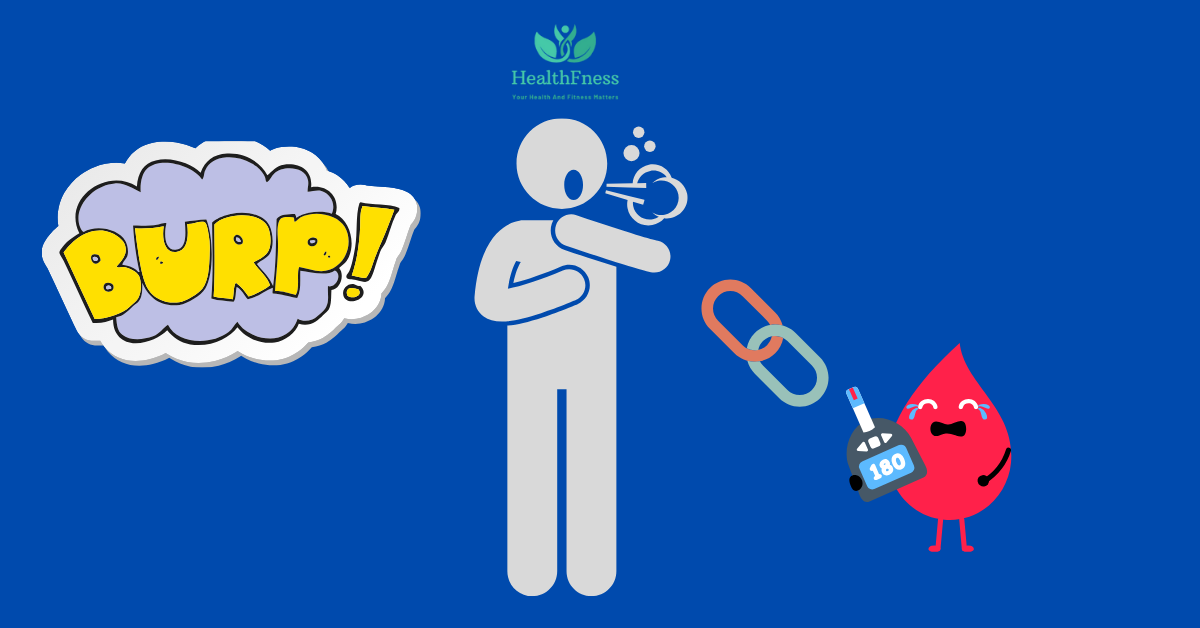A digestive condition known as SULPHUR BURPS causes the mouth to expel foul-smelling gas, frequently with a sulfuric odor that smells very bad.
On the other hand, DIABETES is a chronic illness that impairs the body’s capacity to make or use insulin, a hormone that controls blood sugar levels.
Despite the apparent disassociation between these two disorders, research has revealed a strong connection between sulphur burps and diabetes.
Why You Should Understand Their Connection?
Understanding this connection is crucial since sulphur burps may indicate excessive blood sugar levels or diabetic gastroparesis, a digestive disorder caused by diabetes. Individuals with diabetes can control their blood sugar levels and stop more digestive problems by understanding the connection between them.
In this article, we will uncover or explore in detail What is sulphur burps? how does it develop? and how they relate to Diabetes. And also some treatment options which help manage sulphur burps. So let’s get started😀.
You May Also Like To Read: What Is The Highest Blood Sugar Ever Recorded?
What Are Sulphur Burps?
A sort of belch known as a sulphur burp emits gas with a strong sulfuric odour. When the body digests specific food types, including proteins that contain sulphur, the gas is created.

You May Also Like To Read: How Long Does It Take To Go Blind From Diabetes?
Possible Causes Of Sulphur Burps
There are several causes of sulphur burps here are some of the generalized causes discussed below:
- Consuming foods high in sulphur, such as meat, eggs, and dairy products
- Eating fatty or spicy foods, or any other food that is challenging for the body to digest
- Consuming carbonated liquids
- Take a breath while you’re eating or drinking
- Certain medical diseases, such as Helicobacter pylori infection or gastroesophageal reflux disease (GERD)
Causes Of Sulphur Burps-Tweet This
Symptoms Of Sulphur Burps
In addition to the smell, there are several other symptoms that may be associated with sulphur burps, including:
Bloating or abdominal discomfort_After releasing the gas, individuals can experience bloating, pain, or discomfort in the abdominal area. This can be caused by the buildup of gas in the digestive system.
Nausea or vomiting_The urge to vomit or a feeling of nausea may accompany sulphur burps. This can be because the gas has a bad flavour and smell.
Diarrhoea or constipation_Individuals may have changes in bowel movements, such as diarrhoea or constipation, depending on the origin of the sulphur burps.
Belching or flatulence_Sulphur burps are an example of a belch, but people can also have flatulence, which is the passage of gas via the rectum.
Stomach pain An increase in gas can occasionally result in stomach or abdominal pain.
You May Also Like To Read: Prediabetes ICD 10: Types, Causes And Treatment
What Is Diabetes?
Chronic diabetes reduces the body’s capacity to make insulin effectively or use insulin, a hormone that controls blood sugar levels. The pancreas makes insulin, which aids in transporting glucose (sugar) from the bloodstream into cells for use as fuel. In diabetes, the body either produces insufficient insulin or is unable to utilize it efficiently, which leads to an accumulation of glucose in the bloodstream.
You May Also Like To Read: Can Diabetes Kill You In Your Sleep?
Types Of Diabetes
There are three main types of diabetes
Type 1 Diabetes
When the body’s immune system attacks and starts killing the cells in the pancreas that make insulin, it results in this kind of diabetes, which is mainly diagnosed in children and young adults. For those with type 1 diabetes, regular insulin injections are necessary to control their blood sugar levels
You May Also Like To Read: Can A Diabetic Eat Ice Cream? Let’s Explore
Type 2 Diabetes
The most prevalent kind of diabetes, it usually affects people over the age of 45, while younger people are now experiencing it more frequently. Insulin resistance is a complication of type 2 diabetes, which results from the body’s ineffective use of insulin. High blood sugar levels may result from this, and over time, they may harm tissues and organs.
Gestational Diabetes
Pregnant women with high blood sugar levels but no prior history of diabetes develop this kind of diabetes. It typically appears in the second or third trimester and can raise both the mother’s and the fetus’s risk of problems.
You May Also Like To Read: Best And Worst Foods For Prediabetes 2023
Symptoms Of Diabetes
Some of the symptoms of diabetes:
- Increased thirst and urination
- Fatigue or headache
- Blurred vision or fuzzy vision
- low-healing sores or infections
- Numbness or tingling in the hands or feet
- Unexplained weight loss which shows no valid reason
You May Also Like To Read: Will Stopping Statins Reverse Diabetes?
Sulphur Burps And Diabetes: How Are Sulphur Burps And Diabetes Related?
Since both diabetes and sulphur burping can be caused by digestive problems, there may be a connection between the two disorders. Diabetes can slow down the transit of food through the digestive tract, which can cause bloating, gas, and other gastrointestinal symptoms. Diabetes can also disturb the digestive system in other ways. Sulphur burps may develop from the release of sulfur-containing gases as a result of this.
The formation of sulphur burps may also be influenced by the gastrointestinal side effects of several diabetes medications, such as metformin, which include bloating, gas, and diarrhoea.
Some studies show that people who take medications for diabetes complain about sulphur burps most of the time.
So we know there could be two possible reasons for sulphur burping:
- Diabetes disturbs the digestive system which could be one reason for sulphur burps.
- Different medications used to treat diabetes like metformin and ozempic can cause sulphur burps.
But the number two reason is much more proven because most studies relate that medications used for diabetes cause foul-smelling sulphur burps.
You May Also Like To Read: Is Falling Asleep After Eating Sugar A Sign Of Diabetes?
How Uncontrolled Blood Sugar Levels Can Lead To Sulphur Burps
Diabetes patients with uncontrolled blood sugar levels may experience a range of digestive problems, including sulphur burps. Increased urination and dehydration can result from the body’s attempt to eliminate extra glucose when blood sugar levels are high.
Constipation brought on by dehydration can impede the passage of food through the digestive system and result in the formation of sulphur-containing gases.
Furthermore, high levels of sugar in the blood have the potential to foster the development of dangerous microorganisms in the digestive tract. This can result in illnesses like H. pylori, which can irritate the digestive tract and contribute to the emergence of sulphur burps.
You May Also Like To Read: Can You Donate Plasma With Diabetes?
How Are Sulphur Burps And Diabetes Related?-Tweet This
How Diabetic Gastroparesis Can Cause Sulphur Burps
The disease known as diabetic gastroparesis causes the stomach to empty its contents more slowly than usual. Food that has been sitting in the stomach for a long time may start to ferment, which produces more gases like methane and hydrogen. This may make sulphur burps and other gastrointestinal problems worse.

Managing Sulphur Burps As A Symptom Of Diabetes
Tips And Tricks For Managing Sulphur Burps
- Avoid eating high-protein foods, cruciferous vegetables, and foods high in sulphur compounds, such as dairy and eggs, as these foods might cause sulphur burps.
- To stay hydrated and help in the removal of extra gas from the digestive system, drink water according to your body’s needs.
- Consume smaller, more frequent meals to encourage stomach emptying and avoid gas buildup.
- Drinks with carbonation should be avoided since they may encourage the development of gas in the digestive tract.
- Use excellent dental hygiene techniques, such as routine brushing and flossing, to help get rid of any bacteria that might be causing the formation of sulfur-containing gases.
You May Also Like To Read: Baking Soda And Diabetes: Good or Bad?
Ways To Control Blood Sugar Levels To Prevent Sulphur Burps
Here are some strategies for regulating blood sugar to stop sulphur burps:
- Eating a balanced, healthy diet will help control blood sugar levels and avert increases that may cause sulphur burps. Pick complete, unprocessed foods wherever possible, and consume fewer sweet, high-carbohydrate foods and beverages.
- Physical activity can help control blood sugar levels and enhance insulin sensitivity. Try to exercise for at least 30 minutes, most days of the week, at a moderate level.
- If your doctor has prescribed diabetes medication for you, follow their instructions exactly. This can help you manage blood sugar levels and avoid problems like sulphur burps.
- Develop a monitoring strategy that works for you in collaboration with your healthcare professional.
- Manage your stress efficiently. Stress might cause blood sugar levels to rise. To control stress and stop sulphur burps, try stress-reduction exercises like yoga, deep breathing, or meditation.
You May Also Like To Read: How To Normalize Diastolic Blood Pressure
FAQS
Is sulfur burps from sugar can occur?
Although excessive consumption of sugary foods and beverages might cause blood sugar levels to rise, there is no clear correlation between sugar intake and sulphur burps.
How to get rid of sulfur burps instantly?
While there is no guaranteed way to get rid of sulphur burps instantly, here are a few tips that may provide some relief drinking plenty of water, using antacids, and using activated charcoal and chewing gum can help to relieve sulphur burps.
Sulphur burps and ozempic what’s the connection?
A prescription drug called Ozempic is used to treat type 2 diabetes. It functions by assisting in blood sugar regulation and can be a successful therapy option for many people. However, some people who use Ozempic may develop negative side effects, including gastrointestinal problems such as sulphur burps.
Conclusion
In conclusion, there are a number of ways that sulphur burps are connected to diabetes. Sulfur-containing gases can be produced as well as other digestive problems due to uncontrolled blood sugar levels and diabetic gastroparesis.
While there are a few tactics and tips that may help with sulphur burps, it’s crucial to correctly manage diabetes in order to treat the underlying reason.
Sulphur burps can be avoided by managing diabetes through a mix of appropriate medical treatment, pharmaceutical control, and lifestyle changes. In order to determine any underlying causes and create an effective treatment plan, it is crucial to talk with your healthcare physician if you have chronic digestive issues.
You can enhance your general well-being and quality of life by controlling your diabetes and taking care of any associated digestive problems.
If you have any confusion or questions related to this topic do Let Us Know😊

Dr. Mark Jenkins, MD - General Physician (California, USA)
Dr. Mark Jenkins is a board-certified general physician based in the United States, specializing in preventive medicine, nutrition, and lifestyle health. With years of clinical experience in primary care, he is dedicated to helping patients and readers alike make informed, science-based decisions about their well-being.
As a trusted medical reviewer and contributor to Healthfness.com, Dr. Jenkins ensures that all health content meets the highest standards of accuracy, safety, and evidence-based medicine. His expertise bridges modern medical science with practical, everyday wellness strategies, making complex topics approachable for all audiences.
Outside the clinic, Dr. Jenkins is passionate about living the healthy lifestyle he teaches. He enjoys hiking with his dog, experimenting with vegetarian cooking, and exploring the latest health research. He believes that small, consistent lifestyle changes lead to lasting health improvements, and he aims to inspire readers to take proactive steps toward a healthier, happier life.
Explore more of Dr. Jenkins’ evidence-based insights at Healthfness.com



